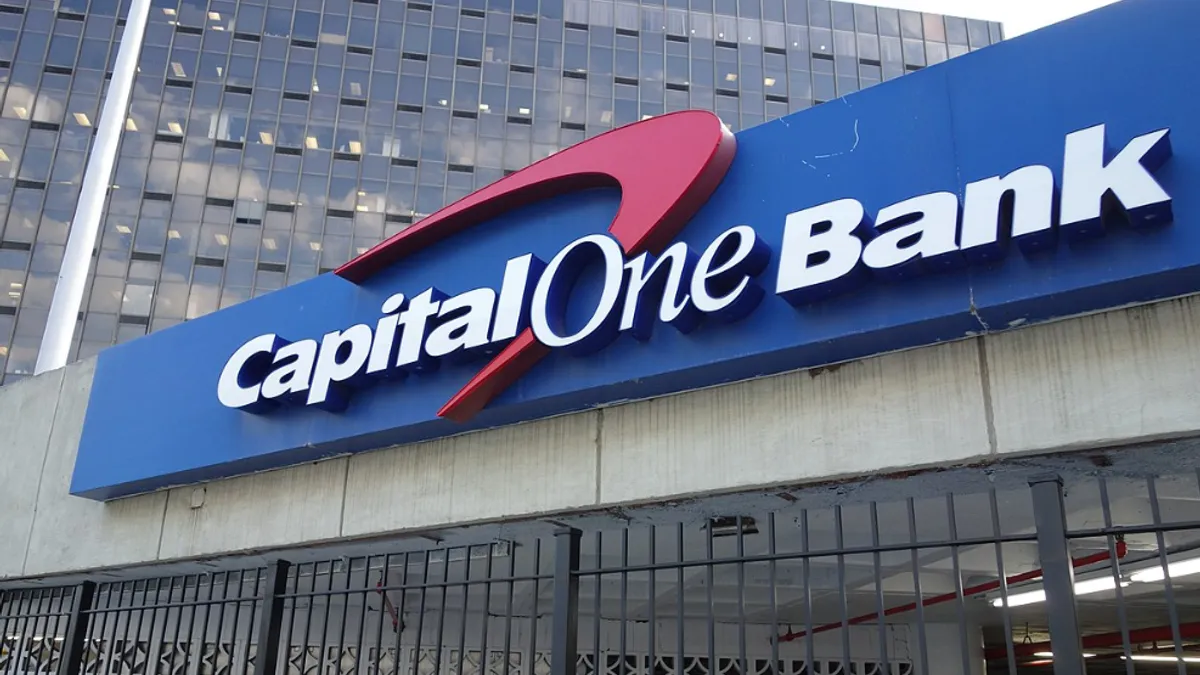Dive Brief:
- Capital One will begin beta-testing a buy-now, pay-later (BNPL) service this year with some of its existing customers at a "select set of merchants" with which the bank already has relationships, CEO Richard Fairbank said Monday at the Barclays investor conference.
- The move marks an abrupt turnaround for the McLean, Virginia-based bank, which, in December, barred customers from using its credit cards to clear buy-now-pay-later debt. "These kinds of transactions can be risky for customers and the banks that serve them," a bank spokesperson said at the time in an email.
- Buy-now, pay-later options have gained steam over the past few years as bank and fintechs vie for a greater share of younger consumers’ spending. Square, for example, announced its intention last month to buy BNPL upstart Afterpay in a $29 billion deal expected to close in the first quarter of 2022.
Dive Insight:
Fairbank said Capital One’s BNPL offering wouldn’t be linked to the bank’s private-label credit-card business, according to Bloomberg. "We’re watching this product closely and certainly not taking this growth lightly," he said.
Buy-now, pay-later platforms such as Affirm, Afterpay and Klarna have courted millennial and Gen Z consumers — who account for more than 80% of BNPL transactions, according to research last year from Cardify.ai — with a model that allows them to pay for purchases in installments without the hefty interest rate that comes with credit cards.
That slighter margin for interest comes at a cost for merchants, though.
"A typical credit card interchange fee is 2% or 3%. The buy-now-pay-later companies usually take about 5% or 6% from the retailers," Ted Rossman, an analyst for Bankrate and CreditCards.com, told Banking Dive this year. "But when the retailers see data like repeat customers who are transacting with larger ticket sizes and coming back again and again, it's a trade-off they're willing to make."
PayPal and Afterpay, for example, have touted data showing consumers spend up to 20% more money when they’re offered a point-of-sale financing option, according to Forbes.
That lure has pushed a number of banks and fintechs into the BNPL space. PayPal, about a year ago, announced it would launch a "Pay in 4" platform that would let consumers pay for a purchase of between $30 and $600 in four installments over a six-week period.
The previous year saw two of the four largest U.S. banks — Citi and JPMorgan Chase — debut products that let users choose a purchase to pay off via fixed payments and a fixed annual percentage rate (APR).
Ally Financial left the credit card business in 2019 in favor of a point-of-sale model. Last year, it announced installment loans on retail purchases between $500 and $40,000. The option — a partnership with Mastercard's Vyze — comes with interest rates between 9.99% and 26.99% over a term of six to 60 months. Such interest rates haven’t been typical in BNPL but are, at the lower end, less than some credit cards charge.
Monday’s announcement softens Capital One’s stance as a BNPL holdout. Fairbank said support from venture capitalists, along with merchants’ willingness to subsidize higher interest costs, have fueled the spike in BNPL popularity.
"The elephant in the room is the sustainability of the merchant subsidy," Fairbank said, according to Reuters. "This is fueled by merchants' beliefs that they're getting incremental volume."
Fintech research firm Kaleido Intelligence doesn’t see the trend going away. It estimated in September 2020 that consumers will spend an estimated $680 billion globally using point-of-sale installment payments over e-commerce channels by 2025.
"It's a whole different bottom infrastructure that [banks] need to play in this space and so they're having to figure out solutions to get to market," Kevin Lewis, chief revenue officer for digital banking service provider Amount, told Banking Dive this year.
John Grund, a managing director in Accenture's payments group, said he expects banks to be "surgical and cautious" in their acceptance of BNPL, evaluating the revenue stream on a merchant-by-merchant basis.
"We are still in the experimentation phase on how prominent BNPL will become," he said. "The fact that upstart new players have been adopted by major merchants is a significant achievement."
Exploration of the space by an establishment player — and recent skeptic — such as Capital One can be seen as a signal of validation.
"Competitors are amassing at the border, and it’s possible they will bid down the level of the merchant discount," Fairbank said, according to Bloomberg. "As there is a drop in margins, it could alter how the business works — who pays for the loans, and which customers ultimately choose the product."















